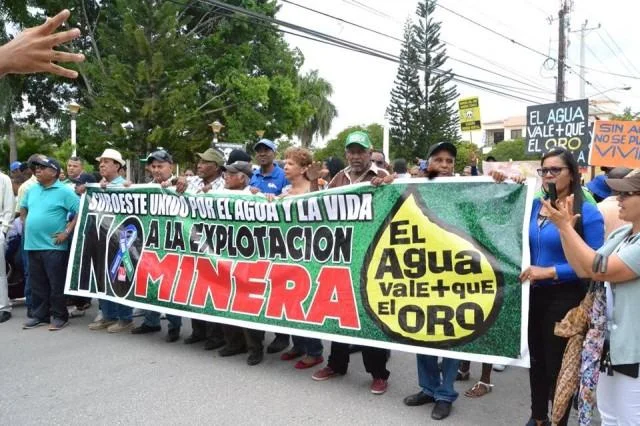Source: El Matero
By ESENDOM
February 20, 2018
In Latin America and the Caribbean, foreign, multinational mining companies are facing opposition from local populations whose memories of colonialism, violence and plunder remain alive. Some of the countries where mining has become a contested issue are neighboring Haiti, Uruguay, Brazil and Argentina among others.
In the Dominican Republic, ordinary people and in particular, peasants and rural dwellers, are quite aware of the destructive effects mining extraction is having on their daily lives as multinationals unleash toxic waste on nature.
The 2009 fight against the construction of a cement factory in the Haitises National Park spread awareness about the environment. At the same time, as the Dominican state opens up the country to foreign investment, the threat to life on the island shared by both Haiti and the Dominican Republic becomes dire.
In one particular case in Cotuí, a town in Sánchez Ramírez province, the Canadian company Barrick Gold left a trail of destruction. A report published by the Mcgill Research Group Investigating Canadian Mining in Latin America summarizes some of that destruction:
Health and environmental hazards have continued to be an issue since the mine achieved commercial production. In September 2014, residents of six communities located next to the mine protested against the health repercussions of soil and air contamination. Tests of residents in four communities revealed their urine and blood contained high levels of cyanide and other heavy metals. The population affirms that the smell of bitter almonds, which is in fact due to cyanide, causes respiratory problems and skin and eye irritation.
Due to more awareness on the aftereffects of mining, people in the Dominican Republic and mobilizing to protect the environment and their livelihoods.
On Feb. 11, thousands marched against gold mining in the southern province of San Juan de la Maguana. When the Ministry of Energy and Mining requested the government to approve a mining concession to GoldQuest, a Canadian mining company, public opinion exploded in anger. That anger as well and growing public indignation with government corruption triggered the recent mass mobilization. The majority of people in San Juan de la Maguana oppose gold mining because it will have negative consequences for agriculture, fauna and human life.
The massive mobilization sent message to pro-government politicians who have no choice but to side with protesters. Marchers demanded President Danilo Medina not grant a mining licence to GoldQuest.
Anti-gold mining sentiment is also present among intellectuals and scientists. On Feb. 6, the Dominican Republic’s Academy of Science issued a swift rebuttal to the Minister of Mining stating that the mining project would have negative consequences for bodies of water such as rivers, according to Listin Diario.
Leading the anti-mining protest are several progressive Catholic priests. The Church’s support to the fight to protect the environment is not new, as some of its more influential sectors have shown opposition to mining exploitation Loma Miranda, a mountain that has become a site of social conflict with mining companies for a number of years.
One of these progressive priests is Father Rogelio Cruz from the Salesian Order who recently denounced an attempt to send him abroad on a mission as a way to cut him off from participating in environment advocacy. Many commentators and activists have come to his defense. As of this writing, the Salesian Order has denied these accusations, according to Acento.
More protests are planned for the future. The recent march in San Juan de la Maguana is a clear indication that ordinary people in the Dominican Republic will mobilize to fight for their right to live in a world free of environmental destruction.
___

